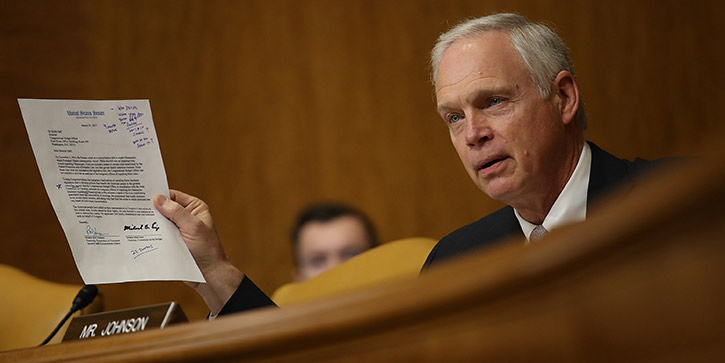
The Return of Porkulus
-
 Jared Dillian
Jared Dillian
- |
- February 15, 2018
- |
- Comments
Before we get going, make sure you check out the Episode 14 of The Monthly Dirtcast. We have Brett Topche, managing director of Red and Blue Ventures, a VC fund that specializes in early stage companies from the Wharton school ecosystem. For all the Philly haters, we have a great discussion on why Philadelphia is so great. Tune in.
As most of you know, I used to be in the Coast Guard. I served from 1992-2001, closely coinciding with Bill Clinton’s time in office.
Let me tell you about working for Bill Clinton. Everyone hated it. The mantra of the Clinton Administration was “do more with less.” Less travel, less supplies, less everything.
The US government was in deficit-cutting mode. Why? Because politics dictated it. People were freaking out about the debt we had run up during the Reagan years, and the deficit was a top issue in both the 1992 and 1996 elections.
We eventually did eliminate the deficit, with a huge tailwind from capital gains tax revenue during the tech boom. And that was about the time that people stopped caring about it.
Really, the turning point was 9/11. At that moment in time, people were ready for big government to stop terrorism. We created an entire cabinet department to do it—Homeland Security.
Spending on security gradually morphed into spending on everything else. George W. Bush dreamed up the prescription drug benefit in 2003. It was all part of “compassionate conservatism,” but deficit hawks weren’t pleased about being compassionate with other people’s money.
In any event, the deficit stayed manageable throughout the Bush years (3% of GDP or less), so there wasn’t any reason to sound any alarms.
Of course, things changed under Obama during the financial crisis and the huge recession—spending quickly went from 3% of GDP to 10% of GDP.
Larry Summers was Treasury Secretary,—the stimulus (which Republicans called “porkulus”) was classic Keynesian countercyclical fiscal policy. Spend money in bad times, save it in good times.
There was plenty of arguing about how effective the porkulus was. Some people said it had a multiplier of close to one—basically no effect. People still argue about it to this day.
Fiscal discipline was restored when Republicans took over Congress in 2010. Safe to say that Obama would have spent a lot more money if he had the opportunity.
Don’t You Think It’s Weird
Don’t you think it’s weird that everyone was freaking out about the national debt when it was 60% of GDP, but now that it is 105% of GDP, nobody cares?
I think that is weird.
During the 2016 election, nobody campaigned on the deficit. Nobody. Not Bernie, not Hillary, not Trump. Not anyone else in the primaries. Not even Rand Paul! Nobody said we should cut spending. A few people said we should raise taxes… but for social justice reasons, not for budget reasons.
Like what you're reading?
Get this free newsletter in your inbox every Thursday! Read our privacy policy here.
The answer is simple. Every other time we worried about it, it turned out to be nothing.
What if you ask the man on the street? Say you were one of those local news programs and left your air-conditioned office and went out on the street and interviewed some randos, and you asked them: “Why is it bad when we run big deficits?”
I assure you that not one person would be able to answer your question.
The answer, of course, is: it makes interest rates go up.
And there is a phenomenon known as “crowding out,” where the government gets to borrow before you do. If the government borrows so much that it pushes up interest rates 2%, then your mortgage rate goes up 2%.
It is helpful to consider where interest rates might be if there were no government debt at all.
Anyway, nobody has had to think of this stuff in a really long time. The bond market is acting kind of crappy, so people are thinking of it now.
The Implications
I’m willing to say that the bond bull market is over. I’ve said that before, here and here. And other people are coming around to that view.
It is going to be hard work owning longer-dated paper. People have become accustomed to juicy returns on bond funds. Not anymore.
Funny thing about bonds—you get people who predict that we will be in a deflationary depression and get negative rates, and you also get people who predict hyperinflation and skyrocketing yields. You don’t get much in between.
I think that over the next few years, the environment for investing in bonds is going to be moderately annoying. Probably the best you can do is clip coupons, but it will likely be worse than that.
And there is zero political impetus for change at the federal level. We have a future of trillion dollar deficits. And it seems unlikely that a Democrats or a Republican primary challenger will run on the deficit issue in 2020.
We have finally learned what we suspected all along: both parties like to spend money. The best check on spending so far has been divided government, but I’m not even sure that’s going to work going forward.
For fun, go to the CBO website and look at the 2008 estimates for what we would be spending in 2018. It will blow your mind.
subscribers@mauldineconomics.com
Tags
Suggested Reading...
|
|

 Jared Dillian
Jared Dillian


